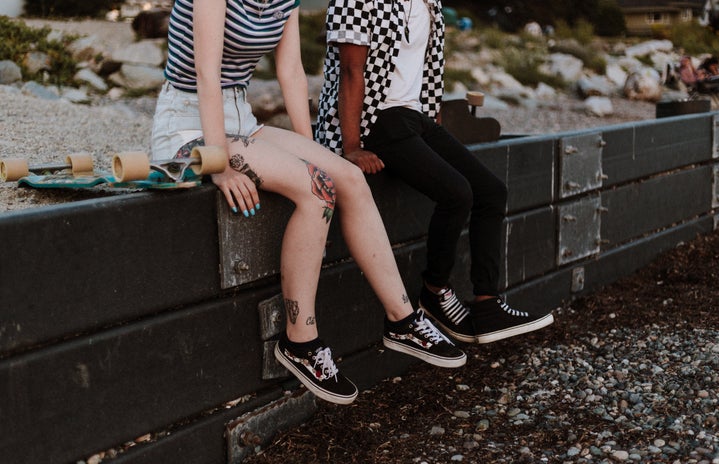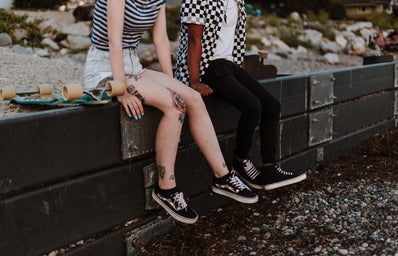As a teenager, I was one of the only people who was out at my school. I came out early for my high school––I came out as bi when I was in ninth grade. I felt a knot in my chest every time I brought it up. Every time someone asked about it, I was terrified that they were going to be confused or not want to be friends with me anymore.
However, I grew up in a liberal city, so little, if anything, was done to me. At least that’s what my mother would say. “You’re so lucky not to be in danger!” “You have nothing to be afraid of!”
At fifteen I got drunk at a party and started dancing and making out with a girl from school who was bi-curious. A man from another school showed up piss drunk. That girl watched me get assaulted on the floor of the party and did nothing to help me. The man would later defend himself, saying: “Well she was being pretty sexual with Delila* so I figured she was down.”
It was really anything but okay. Different boys would find out about my sexuality and fetishize it. People would constantly ask me questions, “I made out with a girl does that mean I’m gay?” “I think I like a girl am I a dyke now?” “Since you’re dating Chelsea* you must be a lesbian now right?”
There were a lot of times I wanted to go back into the closet, to hide, to leave it all behind. My mother took it as a point of pride: “My daughter is gay and I accept her,” her face wide with pride, a special type of torturous attention just for me.
Coming out was hard. While all queer people suffer, bisexual people have been shown to kill themselves more than any other sexual minority. I’m not saying that means it’s harder for us, it was just completely unsurprising to find that out. People are sexualizing you constantly, and everyone wants you to be something else. “Pick a side,” they say—but we can’t. It’s not that easy and you can’t pretend to be something you’re not. My parents’ friends would tell me that bisexuality was a “trick,” something you pretend to be so you don’t have to admit you’re gay. I remember having to constantly prove to myself that I was queer. That it wasn’t just something I was making up for attention from men. I rarely told my straight friends that I actually identified as pansexual because I honestly didn’t want to explain what it was all the time.
I never thought much about my gender. I was always boyish. Before middle school, I wore a lot of clothes that could be considered gender neutral. I never thought about it. People made comments all the time but I tried not to let it bother me.
It started after a flight attendant called me “Mr.” on an airplane. I started crying, aggressively. With my short hair and androgynous clothes, I understood why I could be mistaken for a boy, but that didn’t make it any less upsetting. When I first came to Kenyon, people were constantly asking me for my pronouns or asking me if my name was given. I found myself frustrated with this and upset over it. Would people still want to be with me? Was I even worth being with in the first place?
I found myself enamored with someone. He was a sweet, straight, beautiful boy. My last two relationships had been with bisexual people, a girl and a boy. It had been a long time since I had even wanted to date a straight person. Would he understand me? Could he even love me or trust me? What prejudices would he have towards people like me?
But he didn’t care. He loved me, and I loved him. It was easy.
I started to realize that maybe the reason I got so offended when people misread my gender had more to do with me than it did with them. As I found myself in a more accepting and comfortable environment, I started wearing more androgynous clothing and ignoring gender roles. I felt more and more myself. I figured out I was genderqueer.
But how do I explain this to a straight person? How do I even bring up the subject? It got to the point where I couldn’t keep myself from him anymore. I sat him down and told him that I was questioning and I was terrified. We’re taught as people with female anatomy that if we don’t perform a certain way, our partners won’t love us. That if you love someone, you give up a part of yourself for that person.
He didn’t yell at me, and he wasn’t mad at me. He listened, and he asked questions, and he tried to at least empathize despite not being able to understand. At the end of it all, he didn’t tell me he would love me no matter what because that’s never true, but he did say that he loved me today and that he wanted to keep loving me.
And in the end, that’s all we really have.
I’m still not sure what I am. I really wish I didn’t have to be anything. I don’t want to say what pronouns I go by or feel uncomfortable in situations. I want to just be myself, with no attachment of gender. Until that’s possible, while I may not always have a boyfriend, at least I know I’ll have a loving friend who cares about me no matter how I identify. It’s not about sex or romance: it’s about me respecting his sexuality and him respecting my orientation.
And without respect, there’s really no point to romance at all in my mind.
I love him today and he loves me today, and that’s all that matters.
*Names have been changed for anonymity.

